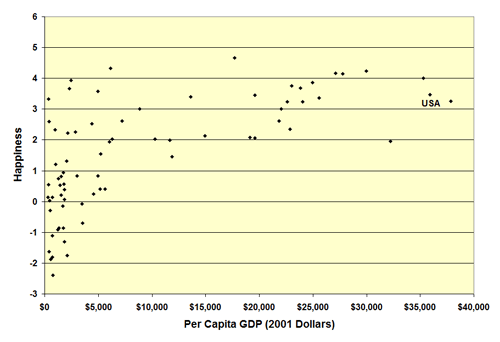
Work Time and
the Good Life
Work Time Choice: Model Policies
Work Time and the Good Life
Choice of work time will make people's lives more satisfying, because people will choose shorter hours only if they think their lives would be better with more free time rather than more income. For example, this is an obvious choice for people with young children, for older people who want to part-time before retiring, and for people who have other responsibilities that conflict with full-time work.
Income and Happiness
There is evidence that, after you have reached an income level considerably lower than the American average, more income does not increase your happiness.
Beginning in 1990, the World Values Survey began asking people in many nations how happy they are. The graph below shows the results of a recent survey, comparing per capita GDP at that time with a happiness rating based on the World Values Survey. We can see that, in lower income countries, self-reported happiness generally increases as per capita GDP increases, but after countries reach about one-half of America’s per capita GDP, self-reported happiness no longer increases as income increases.
Per Capita GDP and Happiness Internationally
(sources: happiness from World Values Survey; per capita GDP from World Bank)This result is not surprising. In poor countries, more income is desperately needed to provide people with decent housing, food, and other essentials; it makes sense that people will become happier as they can afford more of the necessities and basic comforts of life. But once you have the basics of economic comfort, such as good housing, health care, and education, and you also have enjoyable luxuries, such as music, books, and travel, consuming even more does not bring significant benefits - though it does bring significant environmental costs.
Derek Bok, former president of Harvard University, has written a book summarizing the current research on happiness, and he says:
“If it turns out to be true that rising incomes have failed to make Americans happier, as much of the recent research suggests, what is the point of working such long hours and risking environmental disaster in order to keep doubling and redoubling our Gross Domestic Product?” (Bok, The Politics of Happiness, p. 63)
Free Time and Happiness
Studies of happiness have also found that, after people are economically comfortable and secure, satisfaction with life is likely to increase because of:
- Social connections with family and friends.
- Value in the eyes of others.
- Freedom to choose your own actions.
- Access to nature, art, and culture.
- Opportunity for creative expression.
- Ability to care for yourself.
- Participation in governing society.
These things all require time. Yet most Americans do not have the ability to choose the balance of time and income that is needed for the good life.

Follow Us
